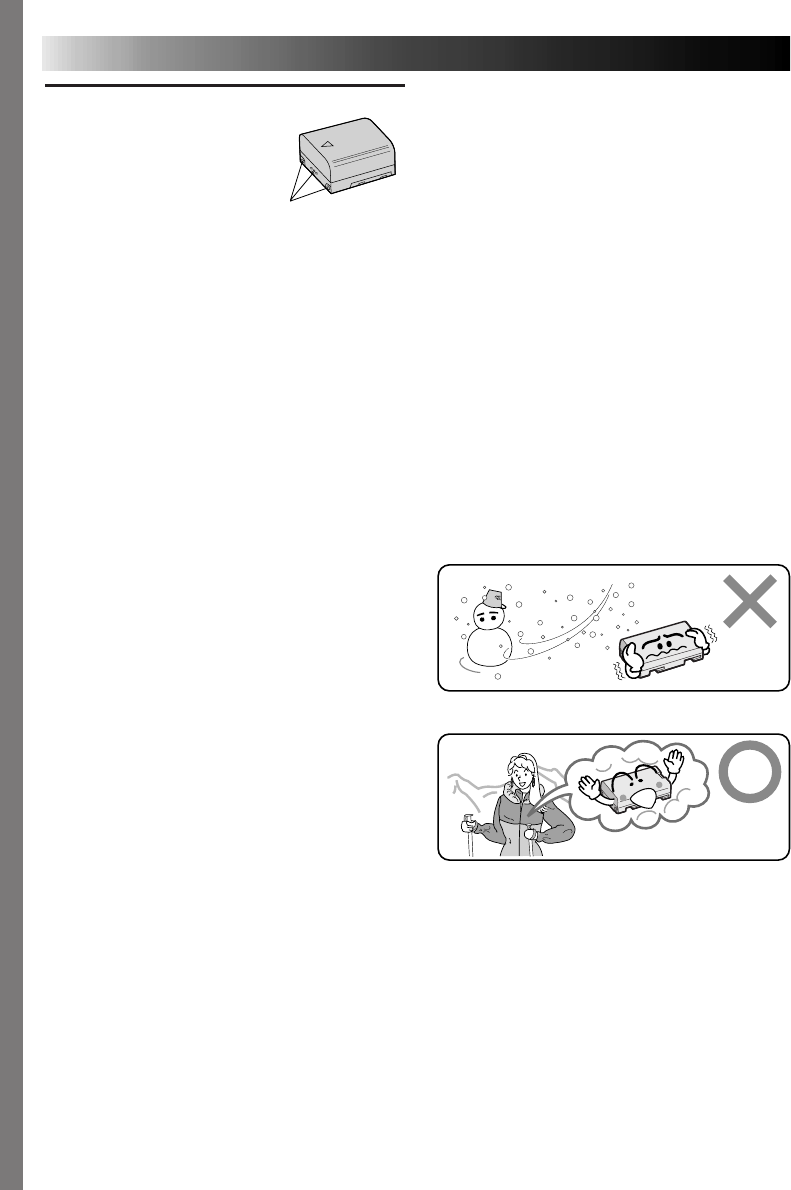
4 EN
CAUTIONS
About Batteries
DANGER! Do not attempt to take the batteries
apart, or expose them to flame or excessive heat, as
there is a risk of fire or explosion.
WARNING! Do not allow the battery terminals, or
the battery itself, to come in contact with metals, as
this can result in a short circuit and possibly start a
fire.
The Benefits Of Lithium-Ion Batteries
Lithium-ion battery packs are small but possess a
large power capacity. However, when the battery
pack becomes cool in an environment subject to
cold temperatures (below 10°C), the battery pack
has a characteristic that its usage time becomes
shorter and may cease to function. If this happens,
place the battery pack in your pocket or other
warm, protected place for a short time, then re-
attach it to the camcorder. As long as the battery
pack itself is not cold, it should not affect perform-
ance.
(If you’re using some kind of heating pad, make
sure the battery pack does not come in direct
contact with the pad.)
Lithium-ion is vulnerable in colder temperatures.
Battery Packs
The supplied battery pack is a
lithium-ion battery. Before
using the supplied battery pack
or an optional battery pack, be
sure to read the following
cautions:
<Depleting the batteries completely>
1. Turn on the power.
2. Set “save mode” to “off” and remove the batteries
when the power is automatically turned off.
1. To avoid hazard . . .
.... do not burn.
.... do not short-circuit the terminals.
.... do not modify or disassemble.
.... do not expose the battery to temperatures
exceeding 60°C, as this may cause the
battery to overheat, explode or catch fire.
.... use only specified chargers.
2. To prevent damage and prolong service life . . .
.... do not subject to unnecessary shock.
.... charge in an environment where tempera-
tures are within the tolerances shown in the
chart below. This is a chemical reaction type
battery—cooler temperatures impede
chemical reaction, while warmer tempera-
tures can prevent complete charging.
.... store in a cool, dry place. Extended exposure
to high temperatures will increase natural
discharge and shorten service life.
.... fully charge and then fully discharge the
battery once a year when storing the battery
pack over a long period time.
.... remove from charger or powered unit when
not in use, as some machines use current
even when switched off.
NOTES:
●
It is normal for the battery pack to be warm after
charging, or after use.
Temperature Range Specifications
Charging ................................ 10°C to 35°C
Operation .............................. 0°C to 40°C
Storage .................................. –10°C to 30°C
●
Recharging time is based on room temperature of
20°C.
●
The lower the temperature, the longer recharging
takes.
Terminals


















